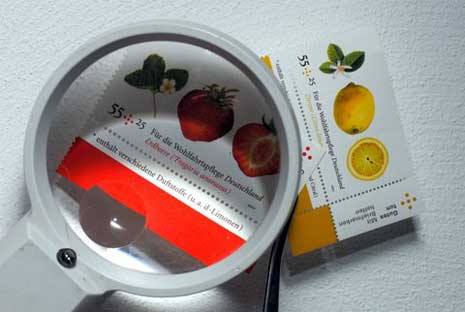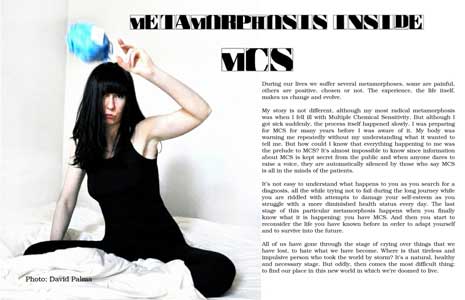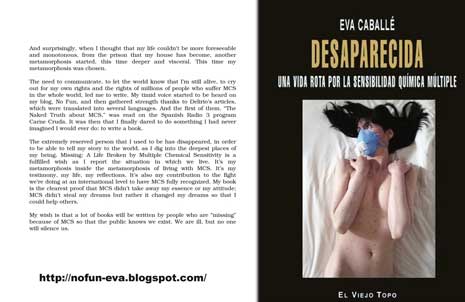
Postage stamps with aroma could affect the health of sensitive people
On January 7th, German Minister of Finance, Dr.Schaeuble, presented the new charity postage stamps to Federal President Horst Koehler and Ms. Donata Freifrau Schenck zu Schweinsberg, President of the Bundesarbeitsgemeinschaft der Freien Wohlfahrtspflege (a federal association of welfare organizations). The unique feature of these stamps for this year is: They are fruit scented – blueberry, strawberry, lemon and apple. The scenting agents are micro-encapsulated and are not supposed to be released until they are rubbed.
The perfumed stamps release a scent even without being rubbed
CSN wanted to know whether the stamps really do not smell until being rubbed and arranged to get samples of the scented stamps. As we asked to buy the new charity stamps, the lady behind the post office counter pulled out an extra folder and remarked almost devoutly, “Oh yes, this are the new perfumy stamps.” She took out a sheet of stamps which showed blueberries and delightedly announced: “Wow, these really can be smelled without rubbing!”
Two welfare stamps were purchased by CSN and examined carefully. Both stamps give off a smell without being rubbed with the finger. Strictly speaking, the strawberry-stamp emits the smell of a cheap toothpaste with strawberry flavor, and the odor of the lemon stamps are a reminder of a toilet cleaner with an artificial lemon aroma. It smells nothing like a natural fruit aroma. The lemon scent grew stronger after the stamp was left at room temperature for a short while. CSN refused to activate the odor by rubbing. It can be assumed that the smell of the stamps will grow by the inevitable friction of the letters during transport and by running them through the sorting system at the postal hubs. Therefore it is quite possible that the perfumed stamps will contaminate other mail.
CSN would like to know if the applied scents were tested for their health compatibility, and which safety criteria and methods they used for the tests. Was their safety criteria the tolerable toxic load for an average healthy adult or was it the tolerable toxic load for the weakest, i.e. for an embryo? Did they test the plain aroma agents or the printing ink equipped with the aroma? Has the material of the stamp an effect on the compatibility? The information of the Bundesdruckerei (German federal printing press) suggests that first amounts of the scents were emitted before even the printing process was completed.
People with asthma, allergy to scents, sensitivities to chemicals, and persons who respond severely to scents could be affected by this advertising stunt.
As an answer, at January 11, CSN wrote the following open letter:
Perfumed Postage Stamps Constrain People with Disabilities
Dear Mr. Federal President Dr. Horst Koehler,
Dear Ms. Frau Donata Freifrau Schenck zu Schweinsberg,
Dear Dr. Wolfgang Schaeuble,
On January 7th, you shared the presentation of the new charity stamps issued by the Ministry of Finance, which emit scents of apple, strawberry, blueberry and lemon when rubbed. We want you to think about that at first glance simpatico idea, and we politely request you Dr. Schaeuble, to withdraw these postage stamps from circulation as Minister of Finance, because there are groups of people with certain disabilities and health disorders, who would be at risk if exposed to these scents.
Wouldn’t it be ironic, if some of those people who should benefit from these charity stamps will be harmed, by putting them in circulation? Do you realize the critical position of the German Federal Environmental Agency (UBA/Umweltbundesamt) regarding scents? The UBA points out that scented products should be avoided in public areas. The German coalition for allergies and asthma the DAAB (Deutscher Allergie- und Asthmabund e.V.) assumes about 11 percent of general population, that was actually a good nine million cases, affected by olfactory hypersensitivity for scents (according to Meggs et al. 1996). They postulate warning signs for scented rooms.
Is it appropriate to characterize those as people with disabilities who respond to scents with health troubles?
According to the ‘Americans with Disabilities Act’ (ADA), an individual with a disability is defined as a person who has a physical or mental impairment that substantially limits one or more major life activities, a person who has a history or record of such an impairment, or a person who is perceived by others as having such an impairment.
The ‘Convention on the Rights of Persons with Disabilities’ (UN-convention) which was signed by the German government on March 30, 2007, defines persons with disabilities as those, who have long-term physical, mental, intellectual or sensory impairments which may hinder their full and effective participation in society on an equal basis with others.
Perfumed postage stamps limit the lifestyle of allergic, asthmatic, chemically diseased and other sensitive persons in an unreasonable way. This violates the UN-convention and does not meet the protection criteria set out for people with disabilities as outlined by the ADA. Severe sensitive cases and those who suffer from contact allergies caused by scents don’t even need to smell traces of those contaminants. Unsuspecting they will contaminate their living space which often is prepared safe from toxins under difficult financial conditions.
Thus far, people with health impairments from scents were able to at least receive and open their mail without help from others. This autonomy and normality of life is taken away from them. If someone encounters physical reactions by being exposed to scents, he/she will become unable to receive mail any longer and has to depend on other people to sort this type of ‘mail bomb’ out. Possibly a whole delivery is lost because one single letter with a perfumed postage stamp has contaminated all other mail.
During the Christmas season of 2004 there was a similar campaign with perfumed scratch stickers. Contrary to the statement of a German mail service personnel, the scents are not securely locked in the ink. None can be sure that somebody rubs the stamps on the dispatch or mechanical interaction will release these substances. At that time when the mail arrived it was already fragrant and it will be again this time.
Potentially such deliveries could sensitize people who have not suffered from an allergy yet. Have the applied scents adequately been tested for that risk? Would you bet your life on their harmlessness? Did you know that most of the scents used in Germany are not tested for tolerance? According to the “Special Report on Allergies, 2000″ (“Spezialbericht Allergien, 2000″) by the German Federal Government, there are about 15 to 25 percent of general population affected by an atopic disease, that was over 20 million cases, and one-third are sensitized for allergies, that was about 27 million. Should not everything be done, to keep this data from growing?
Scents trigger a variety of physical reactions for people with this sensitivity. Depending on disease and state of health, they range from harmless irritations to life threatening conditions. The following troubles can be caused individually or in combinations:
Tiredness, sneezing, irritated eyes, redness, itching, blisters, inflammations, swelling and burning of the lips, nasal mucosa burning, burning of the tongue, toothache, cough, voice failure, labored breathing, vertigo, sickness, headache, migraine, speech disorder, disturbance of memory, permanent painful vomiting, cardialgia, tachycardia, state of shock, absence, coma.
Often, such an incident increases the sensitivity for other substances or undoes a recovery which was hardly achieved by a strategy of avoidance and healthy living over a long period.
If nothing else, artificial scents could disturb the aesthetic perception of healthy ones and never reach the sensuality of their prototypes. Lay some apples from an organic farmer in your bedroom and compare it with the odor from these stamps.
Considering all of the above, we request, that the health damage which may be expected for those people in the general population who are sensitized by scents be recognized and, as under the terms of the Convention on the Rights of Persons with Disabilities, that the circulation of these perfumed postage stamps be immediately stopped.
Kind regards,
Silvia K. Mueller, Bruno Zacke
CSN – Chemical Sensitivity Network
—-
We thank Christi and Jim for translation help.







